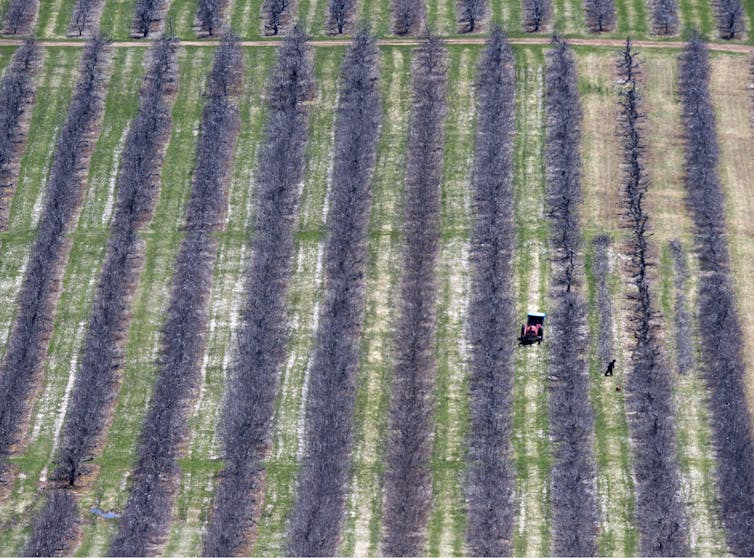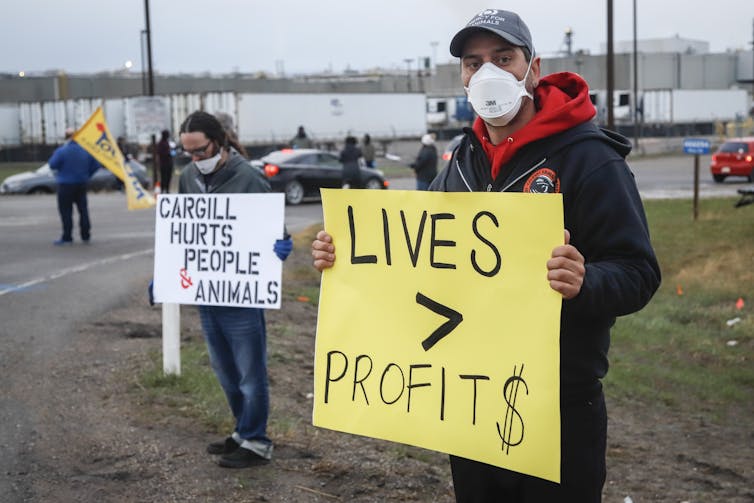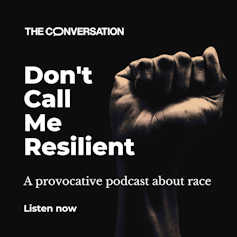This article was originally published on  which features includes relevant and informed articles, written by researchers and academics in their areas of expertise and edited by experienced journalists.
Its authors are: , Assistant Professor of Social Work, and , Associate Professor, Department of Sociology,
Canada’s federal government recently imposed new in an effort to contain the spread of COVID-19. The government and four major airlines agreed to all incoming flights from Mexico and the Caribbean, and closed the Halifax and Moncton airports to international arrivals.
Maritime farming and seafood-processing industries, typically reliant on foreign labour, will be hit hard by the ban, with Mexico and Jamaica among the of temporary foreign workers. In media reports, worried that the regulations would disrupt their labour supply or potentially lead to increased costs.
Temporary foreign workers have historically provided significant labour to Maritime food industries. , Prince Edward Island, New Brunswick and Nova Scotia employed 1,178; 1,963 and 2,824 such workers respectively. However, in 2020 these numbers , leaving the Canadian farm and seafood-processing industries fearful of the impacts of further cuts to the program for the 2021 season.
Travel ban poses big problems
With the travel ban restricting access to temporary foreign workers, the federal government to allow airlines to fly in foreign labour to Maritime airports. Other employers suggested they themselves would need to absorb the costs of chartered flights.
Charter flights have been used since the onset of the pandemic. In the spring of 2020, used chartered flights to fly in eastern European workers to meet national farming demands.
of this practice, asserting that these flights provide inadequate COVID-19 protections for the workers.
The risks were vividly illustrated by images of thousands of workers , without abiding by social distancing rules, at an airport in northern Romania waiting for their charter flights to Germany.
Academic research on the topic has documented the precarity and marginalization of temporary foreign workers, highlighting the fact that they .
Read more:
They are also vulnerable to practices, including ineligibility for overtime pay and even dismissal and repatriation. Media accounts have also long documented unsafe occupational living conditions for migrant workers.
Such issues have been compounded during the pandemic, when the potential of contracting COVID-19, especially at work, has increased.
Overcrowding, inadequate housing
Our team is collecting interview data with temporary foreign workers in the Maritimes through our research partnership, ‚ÄĒ co-ordinated by Ľ∆…ę÷Ī≤•, St. Thomas University, Cooper Institute, the Filipino-Canadian CommUNITY of New Brunswick, as well as the national offices of KAIROS: Canadian Ecumenical Justice Initiatives and the United Food and Commercial Workers Union.
Our preliminary findings, drawn from interviews with participants in Prince Edward Island, indicate that COVID-19 protective measures have been inconsistently implemented for temporary foreign workers.
Migrant workers still frequently experience overcrowding and inadequate housing conditions. Many workers contend with precarious health and occupational conditions. And some experience illegal recruitment and employment practices, where much of the costs of employment are downloaded to the workers.

This is not the first time temporary foreign workers have been restricted from entering Canada during the pandemic. In April 2020, the New Brunswick government . Provincial officials framed the measure , fearing for safety of the province’s residents.
Like the 2020 New Brunswick ban, the issue with January’s travel restrictions is twofold.
First, temporary foreign workers are uncritically positioned as a threat to national populations. Second, arguments against the travel ban are framed solely from a business perspective, prioritizing the concerns of farmers and seafood-manufacturing companies over the health and well-being of the workers.
Read more:
Steep price has been paid
Debates about public safety and temporary foreign workers continue largely without input from those whose health is likely to be most impacted. Migrant workers themselves are largely invisible amid abstract discussions about public risk. The narrative about the largely Black and brown people who work to put food on our tables paints them as risky, and ignores the steep price they’ve paid to work in Canada during the pandemic.
A glaring example is the outbreak at the in Alberta and .

Government travel restrictions are used to protect the health and safety of some while potentially ignoring the health and safety of others. More specifically, while some argue for closing the borders to , others assert that migrant workers should be able to these boundaries, while simultaneously putting their health at risk.
These notions about who can and should move demonstrates that some people are more valuable than others. Citizens are protected at home. Others are labouring at farms, putting themselves at greater risk of being infected.
Profits trump concerns about worker health
It would be a different story if the opposition to the travel restrictions was based on the fact that migrant workers are unable to make a living back home. That would place the workers’ concerns at the heart of these debates.
But that’s not the case. The industry is asking for travel exemptions so that the agricultural and fishing season can unfold as usual and profits can be made. The interests of workers are obscured while public attention centres on the industry’s interests.
Workers are caught between a rock and a hard place. Either they’re allowed to work and expose themselves to the risk of COVID-19 infection, or they’re prohibited, through travel restrictions, from entering the country and deprived from making a living.
Temporary foreign workers continue to be the pandemic’s collateral victims, put in harm’s way so Canadians don’t get infected while relishing the fruits of migrant workers’ labour at their dinner tables.
This article is republished from under a Creative Commons license. Read the .

